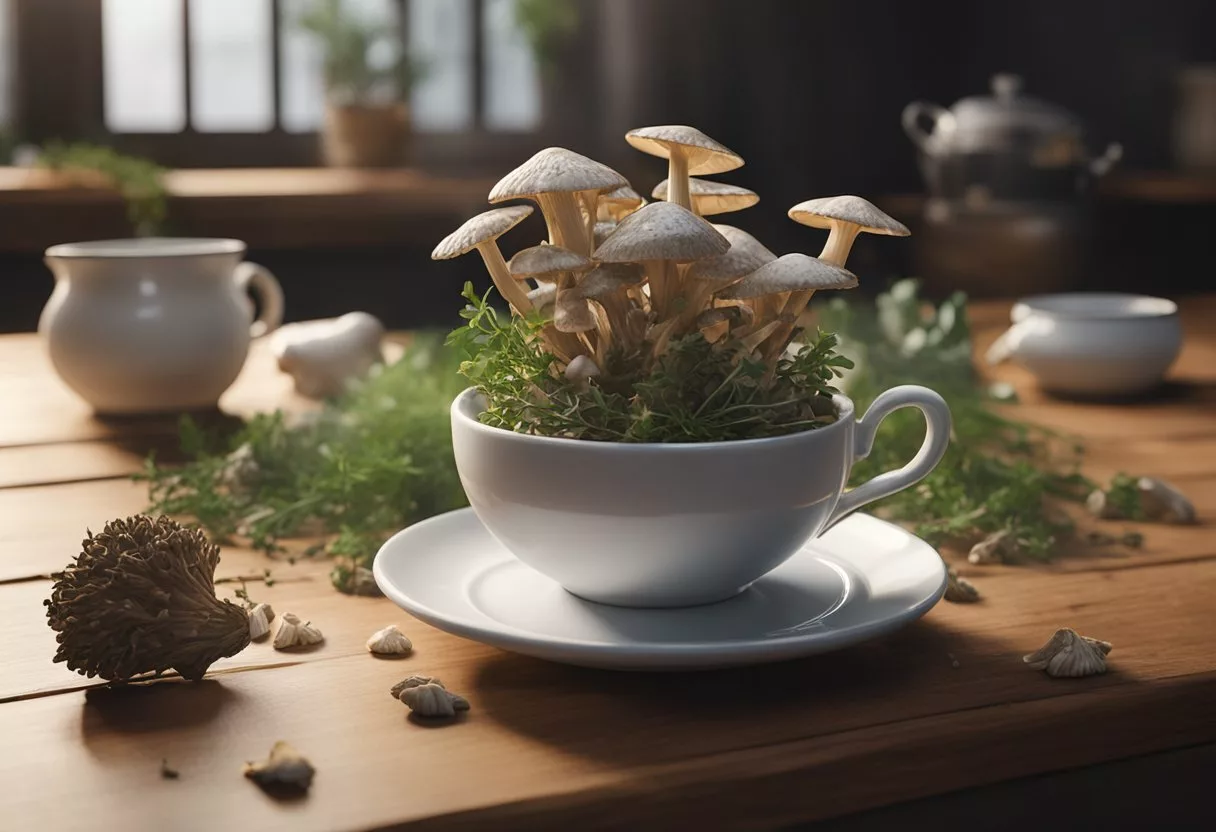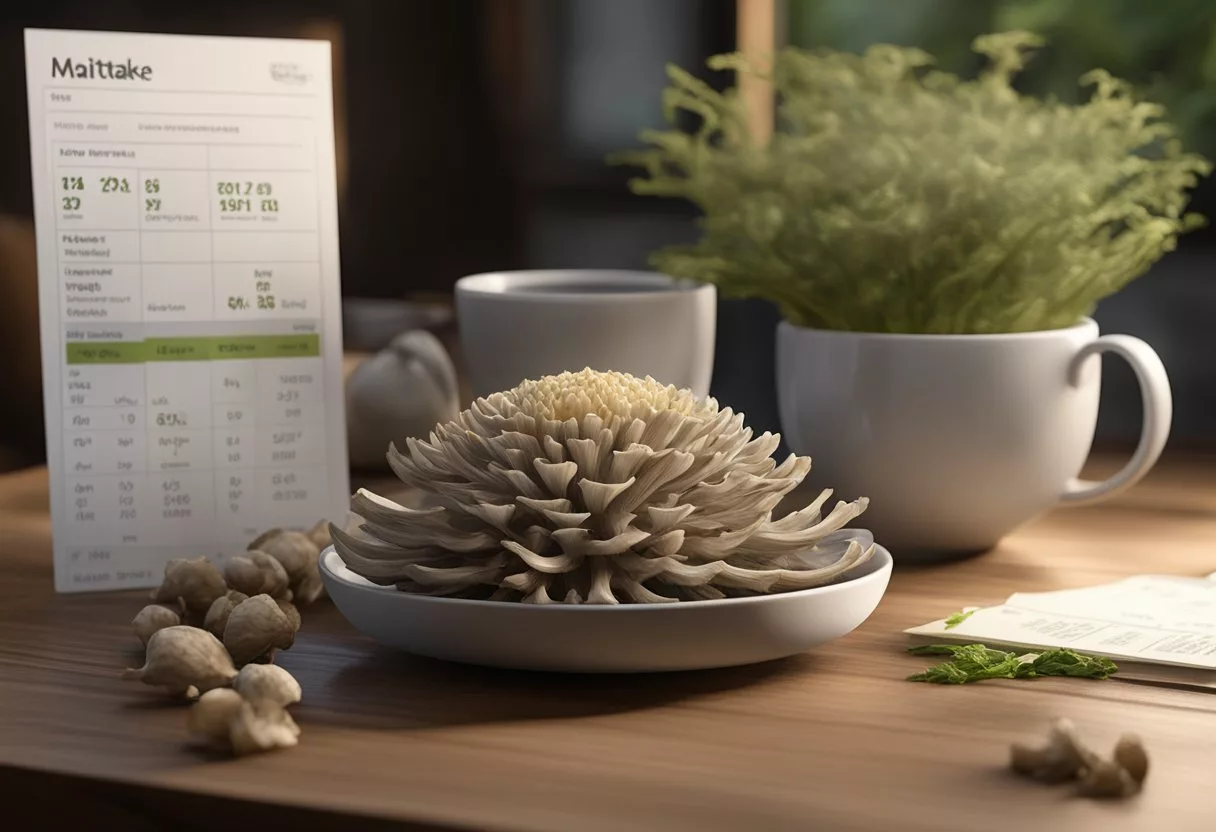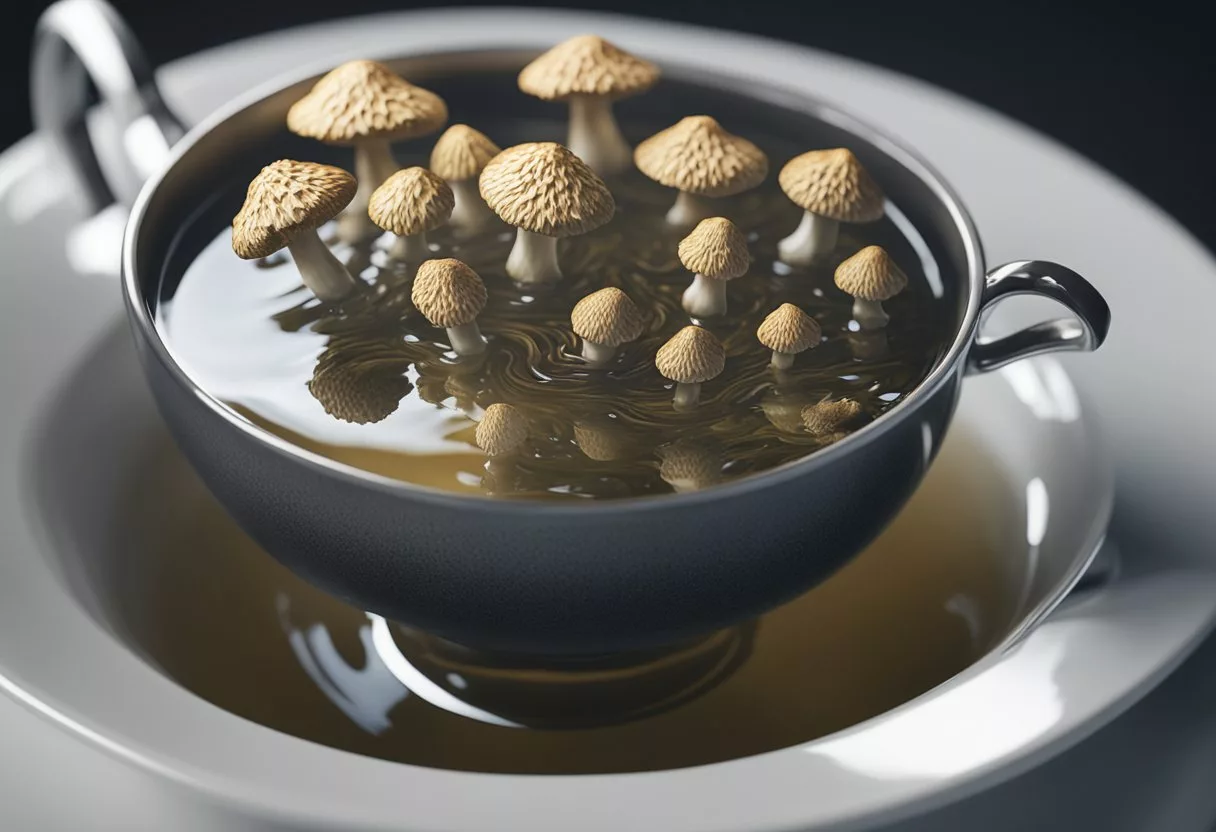Maitake mushroom tea has become popular due to its numerous health benefits and unique flavor. Known for its immune-boosting properties, maitake mushrooms are a powerful addition to any diet. Drinking maitake mushroom tea can help support overall health by providing essential nutrients and antioxidants.

Maitake mushrooms are rich in beta glucans, which have been shown to improve immune function. They also contain vitamins such as niacin and riboflavin, as well as minerals like phosphorus and potassium. Incorporating maitake mushroom tea into your routine can be an easy way to enjoy these benefits.
To make the most out of maitake mushrooms, try incorporating them into your diet through various recipes. Whether enjoyed as a tea or added to soups and stir-fries, these mushrooms offer a versatile way to boost your nutrient intake.
Key Takeaways
- Maitake mushroom tea supports overall health with essential nutrients.
- They are rich in immune-boosting beta glucans and vital vitamins.
- Easy to incorporate into various meals and dietary routines.
Overview of Maitake Mushrooms

Maitake mushrooms, known for their unique appearance and health benefits, have a rich history and a firm place in modern science. They are a valuable source of nutrients and compounds that support health.
Historical Significance
Maitake, also called Grifola Frondosa or Hen of the Woods, has long been treasured in Japan and China. In Japan, the name “Maitake” translates to “Dancing Mushroom,” as folklore suggests people danced with joy upon discovering this valuable fungus.
Historically, these mushrooms were used not just for culinary purposes but also for traditional medicine. They were believed to boost immunity and overall health. In feudal Japan, they were so prized that they were worth their weight in silver. This historical value underscores the esteem in which they were held for both their taste and medicinal properties.
Scientific Classification
Maitake mushrooms belong to the genus Grifola, with the species name Frondosa. This species flourishes in parts of North America, Japan, and China. They typically grow at the base of oak, elm, and maple trees.
Scientific Classification:
- Kingdom: Fungi
- Phylum: Basidiomycota
- Class: Agaricomycetes
- Order: Polyporales
- Family: Meripilaceae
- Genus: Grifola
- Species: G. Frondosa
These mushrooms have a characteristic clustered form, resembling a hen sitting on her nest, giving rise to the common name “Hen of the Woods.” Their growth pattern and habitat play a role in their high nutritional value, including significant levels of potassium, fiber, and B vitamins.
Health Benefits of Maitake

Maitake mushrooms are known for their numerous health benefits. They help boost the immune system and are linked to cancer prevention and treatment. They also aid in managing blood sugar, cholesterol, and weight.
Immune System Boost
Maitake mushrooms contain compounds that help strengthen the immune system[1]. Beta-glucans, found in maitake, enhance the body’s ability to fight infections and diseases. These mushrooms are also rich in antioxidants, which help protect cells from damage.
Additionally, maitake mushrooms have anti-inflammatory properties. This helps reduce inflammation and supports overall immune response. Consuming maitake mushrooms in various forms, like tea, may help improve general health and longevity.
Cancer Prevention and Treatment
Research indicates that maitake mushrooms may aid in cancer prevention and treatment. The mushrooms contain D-fraction, a compound that enhances the body’s immune response to cancer cells. Studies suggest that beta-glucans in maitake mushrooms stimulate immune cells to attack tumors.
Maitake also synergizes with Interleukin-2, boosting its effectiveness against cancer cells. People undergoing cancer treatments might find that maitake supplements improve their outcomes.
Blood Sugar and Diabetes Management
Maitake mushrooms can help manage blood sugar levels. They contain compounds that improve insulin sensitivity, making it easier for the body to regulate blood sugar. This is particularly beneficial for people with diabetes or those at risk.
Further, regular consumption of maitake mushrooms may help prevent sudden spikes and drops in blood sugar. This stabilizing effect supports overall metabolic health.
Cholesterol and Heart Health
Consuming maitake mushrooms can be beneficial for cholesterol and heart health. They contain nutrients that help lower bad cholesterol (LDL) and triglycerides. By reducing these, maitake mushrooms can help prevent heart disease.
Maitake mushrooms are also rich in antioxidants and potassium, which support heart health. These nutrients help maintain normal blood pressure and reduce the risk of cardiovascular issues.
Weight Management and Metabolism
Maitake mushrooms can assist with weight management and obesity. They are low in calories but high in essential nutrients. This makes them a great addition to a balanced diet.
The mushrooms boost metabolism and help the body burn fat more efficiently. They also promote a feeling of fullness, which can reduce overall calorie intake. Incorporating maitake mushrooms into meals or as a tea can be a good strategy for those looking to manage their weight.
Nutritional Profile of Maitake

Maitake mushrooms are a powerhouse of nutrients, offering a wide range of vitamins, minerals, protein, and fiber. These components make maitake a beneficial addition to diets aiming for balanced nutrition.
Key Vitamins and Minerals
Maitake mushrooms are particularly rich in essential vitamins and minerals. They contain significant amounts of B vitamins, like niacin and riboflavin, which play crucial roles in energy production and overall metabolism. Additionally, maitake mushrooms are one of the few non-animal sources of Vitamin D, which supports bone health and immune function.
Copper and potassium are other vital minerals found in maitake mushrooms. Copper aids in forming red blood cells and maintaining healthy immune functions, while potassium is critical for heart health and proper muscle function. This combination of nutrients makes maitake a highly valuable food item.
Protein and Amino Acids
While maitake mushrooms are not as protein-dense as meat, they do provide a modest amount of protein. For instance, one cup (about 70 grams) of maitake contains roughly 1.4 grams of protein. This protein content includes various amino acids essential for body functions, including muscle repair and enzyme production.
Beta glucan, a type of fiber found in these mushrooms, also has immunomodulating effects, further enhancing their nutritional profile. The protein and amino acid content, combined with other beneficial compounds, make maitake a useful addition to vegetarian and vegan diets.
Fiber Content
Maitake mushrooms offer a substantial amount of dietary fiber. One cup of these mushrooms provides approximately 1.9 grams of fiber. This fiber aids in digestion and helps maintain a healthy gut. Including fiber-rich foods like maitake can improve regularity and support overall gastrointestinal health.
The fiber content, coupled with low calories and carbohydrates (about 22 calories and 4.9 grams of carbohydrates per cup), makes maitake mushrooms an ideal choice for those looking to maintain a healthy weight and manage blood sugar levels.
Making Maitake Mushroom Tea

Making maitake mushroom tea is a straightforward process that brings out the unique flavors and health benefits of the mushrooms. Here’s how to do it, along with some variations to suit different tastes.
Step-by-Step Brewing Guide
- Measure Ingredients: For every cup of water, use a heaping teaspoon of dried maitake mushroom powder.
- Boil and Simmer: Bring water to a boil in a pot. Reduce the heat to low and add the mushroom powder. Let it simmer for about 15-20 minutes.
- Strain and Serve: Use a fine-mesh strainer or cheesecloth to remove the mushroom pieces from the liquid. The tea should be dark brown and ready to drink.
- Enhance Flavor: If desired, add honey, lemon, or other herbs to enhance the taste.
Recipe Variations
- Lemon and Ginger: Add a slice of lemon and a small piece of ginger during the simmering process for a zesty twist.
- Herbal Blend: Mix maitake mushrooms with other herbs like chamomile or peppermint to create a unique herbal tea blend.
- Chai Style: Combine with spices like cinnamon, cardamom, and cloves for a chai-inspired mushroom tea.
- Cold Brew: Steep maitake mushrooms in cold water for several hours or overnight in the refrigerator. This creates a refreshing cold brew tea.
By experimenting with these variations, one can enjoy maitake mushroom tea in many delightful ways.
Maitake in Traditional and Modern Medicine

Maitake mushrooms have been used in traditional medicine for centuries, especially in Asia. Modern research continues to uncover their numerous medicinal properties, showcasing their adaptogenic abilities, molecular components, and contemporary uses.
Adaptogenic Properties
Maitake mushrooms are recognized as adaptogens. These substances help the body resist stressors of all kinds, whether physical, chemical, or biological. Many people use maitake mushroom tea for its calming and stress-relieving effects.
In traditional medicine, maitake is known for its immune-boosting qualities. It contains chemicals that help cells resist stress, strengthening the body’s defenses. Adaptogens like maitake can normalize body functions and improve overall resilience.
Maitake’s adaptogenic properties are linked to its unique blend of beneficial compounds, making it a valuable addition to herbal teas and supplements.
Molecular Components and Medicinal Properties
Maitake mushrooms are rich in bioactive compounds, including beta glucans and polysaccharides. These elements are critical for their health benefits.
Beta glucans are known for their ability to modulate the immune system. They increase the activity of certain immune cells that help fight infections and diseases. Polysaccharides found in maitake also play a role in immune regulation, helping the body respond more effectively to pathogens.
Moreover, maitake mushrooms contain a variety of B vitamins, which are essential for energy production and brain function. Vitamin D in maitake supports bone health and immune function. These molecular components make maitake mushrooms a powerful medicinal resource.
Contemporary Research and Uses
Recent studies on maitake mushrooms have provided more scientific backing for their traditional uses. Research supports their role in enhancing immune function and shows potential in cancer prevention. Some studies suggest maitake can improve insulin sensitivity, which may be beneficial for managing diabetes.
Today, maitake mushrooms are used in various forms, including teas, broths, supplements, and extracts. In traditional Chinese medicine, maitake is often included in herbal teas for its health benefits. These modern applications continue to expand as more research highlights their effectiveness.
Maitake mushroom tea combines these medicinal properties in a simple, easy-to-consume form, bringing the benefits of this ancient remedy to contemporary health practices.
Risks and Considerations

Maitake mushroom tea is popular for its potential benefits, but it’s important to be aware of possible risks. This section covers side effects, interactions with medications, and advice for certain health conditions.
Potential Side Effects
Some individuals may experience side effects from maitake mushroom tea. These can include stomach upset, nausea, and diarrhea. People with allergies to mushrooms should avoid it due to potential allergic reactions. In rare cases, maitake mushrooms can cause skin rashes or difficulty breathing, which are signs of a serious allergic reaction.
Long-term use of maitake mushroom tea has not been extensively studied, so its long-term effects are not well known. Always monitor for any adverse reactions when trying a new herbal product.
Interactions with Medications
Maitake mushroom tea can interact with certain medications. It is known to lower blood sugar levels, so people taking diabetes medication might need to be cautious. The tea may enhance the effects of these drugs, leading to dangerously low blood sugar levels.
Individuals on blood-thinning medications or those with bleeding disorders should also be careful. Maitake mushrooms can increase the risk of bleeding. Prior to surgery, it is recommended to stop consuming maitake mushroom tea to minimize this risk.
Advice for Specific Conditions
For those who are pregnant or breastfeeding, consuming maitake mushroom tea is not well-studied and may pose unknown risks. It’s best to avoid it unless advised otherwise by a healthcare professional.
People with infertility issues should also consult a doctor before using maitake mushroom tea, as its effects on fertility are not fully understood. Additionally, individuals with autoimmune diseases may find maitake mushrooms stimulate the immune system, which could potentially worsen their condition.
It’s always important to consult with a healthcare provider before adding maitake mushroom tea to your routine, especially if you have underlying health conditions or are taking other medications.
Incorporating Maitake into Your Diet

Maitake mushrooms can be added to your diet in various ways. They can be used in soups, pasta, and rice recipes, or taken as extracts and supplements for their nutritional benefits.
Beyond the Tea: Other Culinary Uses
Maitake mushrooms, also known as “Hen of the Woods,” can be a versatile addition to many dishes.
For a hearty soup, add chopped maitake to chicken or vegetable broth. Its earthy flavor enhances the overall taste, providing a comforting meal. Another option is to include maitake in pasta dishes. Sauté the mushrooms with garlic and olive oil and toss them with your favorite pasta and a sprinkle of Parmesan cheese.
In rice recipes, maitake can be used in stir-fries or risottos. They pair especially well with other vegetables and lean proteins like chicken or tofu. You can also roast maitake mushrooms in the oven. They maintain their juicy texture and rich taste, making them a delicious side dish.
Maitake mushrooms are not limited to savory dishes. You can even add them to morning coffee for an earthy twist.
Supplements and Extracts
For those who find it difficult to incorporate maitake mushrooms into their meals, supplements and extracts are available. Maitake mushroom supplements come in several forms, including capsules and powders. These can be easily added to smoothies or taken with water.
Maitake Mushroom Extract, often referred to as D-fraction, is another option. It is known for its potential health benefits, including immune support and blood sugar regulation. D-fraction can be found in liquid or capsule form and can be taken daily.
These supplements provide a concentrated form of the mushroom’s benefits, making it easier to incorporate into a busy lifestyle. Whether through culinary uses or supplements, maitake mushrooms offer many health advantages.
Frequently Asked Questions

Maitake mushroom tea is popular for its potential health benefits, ease of preparation, and safety for daily consumption. This section addresses common questions related to these aspects.
What are the benefits of drinking mushroom tea?
Maitake mushroom tea offers potential benefits such as boosting the immune system. The adaptogenic properties of maitake help cells resist various types of stress. Some studies suggest it may also have antitumor effects.
How is mushroom tea prepared?
Typically, mushroom tea is prepared by steeping dried or powdered maitake mushrooms in hot water. Some people prefer adding other ingredients like ginger or lemon for flavor. It’s also available in pre-packaged blends for convenience.
What potential side effects might one experience from consuming mushroom tea?
Most people don’t experience significant side effects. However, some might have allergic reactions or gastrointestinal issues, like nausea. It’s advisable to start with a small amount to see how your body reacts.
How does mushroom tea impact overall health?
Regular consumption of maitake mushroom tea may support immune function, stress resistance, and overall wellness. Its bioactive compounds can help maintain cellular health and may even aid in fighting infections.
Is it safe to consume mushroom tea on a daily basis?
For most individuals, drinking maitake mushroom tea daily is safe. Always consult with a healthcare provider if you have any health conditions or are taking medications, as interactions might occur.
What are the specific health advantages of using mushrooms in tea?
Mushrooms like maitake add valuable nutrients and adaptogens to the diet. These can help with stress management, immune support, and possibly lowering blood pressure. Some research also indicates a role in cancer prevention.
References
- Maitake Mushroom: Health Benefits, Nutrients per Serving, Preparation Information, and More. https://www.webmd.com/diet/maitake-mushroom-health-benefits Accessed November 4, 2025
